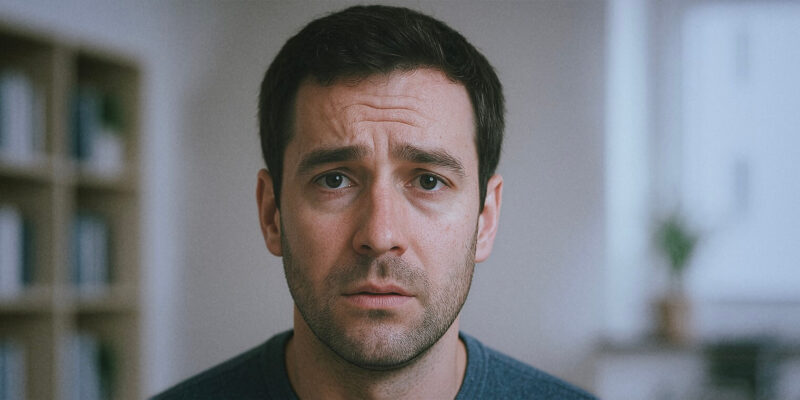When I worked as a therapist, some people showed up to my office with very specific problems they wanted to fix: chronic insomnia, panic attacks, fear of spiders, stuff like that.
But usually people weren’t completely sure why they needed therapy…
- I’m not depressed, I just don’t feel much joy in my life anymore…
- My life is great but I can’t shake this nagging unhappiness.
- I should be happy—I have a lot of good things and people in my life—but I’m just not and I have no idea why…
So a big part of our work together was just trying to uncover the root causes of their unhappiness in the first place. And I think this is something a lot of us can relate to:
The core causes of our unhappiness aren’t always obvious.
In fact, there are often very subtle psychological reasons why we’re chronically unhappy. And illuminating them is the first step toward a more joyful and fulfilling life.
If you feel like you should be happier than you are, try to identify and eliminate these subtle psychological causes of unhappiness.
1. You won’t let go of your resentments
One of the most obvious signs that someone is chronically unhappy is that they’re full of resentments:
- They’re always complaining about their insensitive boss or annoying manager.
- Conversations about how they’re struggling always seem to return to the same childhood stories about how they were wronged or let down.
- And nobody, apparently, truly understands their pain and suffering and how much they’ve been hurt.
Of course, we all fall into unproductive complaining sometimes! But for some people, it’s almost a way of life…
Some people hold on to past injuries so hard that they become defined by them.
In other words, some people are their resentments. They’re so consumed by them that their whole life starts to revolve around their hurt and pain in the past.
And if you stop and think about it, how could you not be miserable and unhappy if your whole life revolved around past injuries?
- How could you set meaningful goals for the future and move toward them when you’re constantly ruminating about the past?
- How could you maintain healthy relationships if you’re lost in the past that you can’t be truly present with people in the moment?
- How could you enjoy happy moments and positive emotions if your mind is constantly in analysis mode trying to understand the details of every slight committed against you?
But if holding on to resentment is so obviously toxic and makes us so chronically unhappy, why do we do it?
Why is it so hard to actually let go of our resentments?
Of course everyone’s situation is different. And there are many factors that go into this. But one of the most common reasons people struggle to let go is that they’re confused about what letting go actually means. Specifically this:
Letting go of resentment is a habit, not a decision.
See, a lot of people think that once they decide to actually let go of the past and move on, that should be enough. But if you think about it, that’s completely unrealistic!
You’ve spent years—decades, maybe—rehearsing and reinforcing the mental habits of ruminating and elaborating on your resentments. Do you think all that mental reinforcement is just going to vanish in the blink of an eye because you’re decided you want to let go?
That’s like saying the pounds are going to melt off because you’ve decided to lose weight!
I mean, don’t get me wrong: the initial decision to let go is important. But that’s only the very first step…
If you truly want to let go of resentments, you must commit to retraining your brain out of the habit of resentment.
And like any form of training, that’s going to take time, patience, and practice.
That means that dozens of times per day you’re going to feel the pull to start thinking more about your resentments. And each time, you’re going to have to recommit to letting those go and staying focused on the present. And each time it’s going to be hard, in part because you very well may be justified in your resentments.
Yes, you were hurt. And yes, you have every right to feel hurt and to remind yourself of how unfair and bad that was. But here’s the thing…
Just because you’re justified in your resentments doesn’t mean they’re good for you.
If you really want to let go of past resentments you must commit to the practice of keeping your attention focused on the present despite being justified in revisiting the past.
“Forgiveness is not an occasional act, it is a constant attitude.”
― Martin Luther King Jr.
2. You worry about things you can’t control
Unfortunately, it’s not just the past that we have trouble letting go of… Many people’s unhappiness stems from chronic worry about the future.
Worry is unhelpful negative thinking about what might happen in the future.
It’s different than problem-solving or planning in that it doesn’t result in anything productive and is usually irrational.
But like ruminating, it’s something we all do sometimes…
- We worry about what our boss thought of our new proposal
- We worry about what our spouse will say if we give them honest feedback
- We worry about how our child will handle their first day of school
While the occasional unrealistic worry leads to a little anxiety and tension, it’s not going to be a major barrier to your happiness in life. Most people have a little worry and brush it off relatively quickly so they can get back to their lives.
But some people get stuck in worry. So much so that it becomes a habit or even a compulsion:
- During meetings at work, you’re constantly thinking about what other people are thinking about you—so much so that it’s hard to simply stay focused on the topic of the meeting.
- You spend so much time imagining terrible situations where your spouse leaves you that you never give them honest feedback or criticism. Which leads to a lack of intimacy in the relationships and constant anxiety in you.
- You worry so much about your child struggling at school that you regularly check in with school staff to get reassurance that they’re doing alright. And while it feels relieving in the short-term, it’s only making your anxiety worse and the school’s frustration higher.
And along with this chronic worry comes tremendous amounts of near-constant anxiety and stress. Which leads to the fairly straightforward realization that…
It’s hard to be happy when you’re constantly anxious.
But if chronic worry leads to so much anxiety and unhappiness, why do we do it?
Why continue to worry about things that we know aren’t really rational or are outside of our control—especially where doing so makes us so miserable?
Contrary to common misconception, most chronic worriers know that their worry is irrational and unhelpful:
- Nobody actually believes that worrying about their spouse’s plane flight will make it less likely that they get in a crash.
- Nobody actually believes that worrying about what other people think is going to make them think more positively.
In other words: We don’t worry to change outcomes. We worry to change ourselves. More specifically…
We worry because it temporarily makes us feel more in control.
Even though worry doesn’t do anything productive, and even though it makes us feel anxious and unhappy in the long-term, we worry because in the short-term it makes us feel better—it makes us feel like we can do something about concerns that are fundamentally outside our control.
See, human beings absolutely hate feeling helpless. We hate helplessness so much that we’re willing to feel incredibly anxious and unhappy if for a brief moment it alleviates that helplessness and makes us feel more certain and in control.
Like eating junk food, we worry because, despite the long-term negative consequences, the short-term benefits are powerful…
- You can’t completely control whether your child has a hard first day at school. But obsessively thinking about it gives you something to do—something that feels a lot like true problem-solving. And so temporarily, it makes you feel just a little less helpless.
- You can’t completely control whether some people dislike you. But worrying about what they think gives you something to do. And as a result, temporarily distracts you from the emotional pain of acknowledging that other people might not like you and there’s not always a whole lot you can do about it.
To sum up:
We worry because we like to feel in control.
Unfortunately, that feeling is only temporary. But the tool we used to get there—worry—is both unproductive and massively anxiety-producing.
Because we’re unwilling to face up to our lack of control, we make ourselves miserable with anxiety and stress.
On the other hand, if you’re willing to acknowledge and tolerate your helplessness, you can eliminate the habit of chronic worry and reclaim much of the happiness it was stealing.
“Worry never robs tomorrow of its sorrow, it only saps today of its joy.”
― Leo Buscaglia
3. You surround yourself with people you don’t like
One of the great myths of the self-help movement is that your struggles are all in your head.
That if you just improved your mindset, updated your unhelpful beliefs, or started thinking more positively, everything would be better, including your happiness.
This is nonsense.
Our circumstances in life—especially other people—do affect us no matter how much positive thinking we do.
Obviously, how we think matters too. But to believe that circumstances don’t matter as long as you have the right mindset is not only delusional, it’s also dangerous.
Here’s why: When you put all your resources into managing yourself, you have little left to manage your environment.
And your environment does matter, especially your social environment…
- If you’re married to a manipulative narcissist, you’re going to be unhappy no matter how many positive mantras you recite to yourself every morning.
- If you spend 8 hours a day working in a company you hate, doing work you despise, with people you can’t stand, you’re going to be miserable no matter how much mindfulness meditation you do.
- If you keep allowing your mother to intrude on your marriage, you’re going to have a lot of relationship conflict and unhappiness no matter how many couples therapy sessions you attend.
This is all to make what should be a fairly straightforward point:
The people you surround yourself with profoundly influence your happiness in life.
If you surround yourself with supportive, honest people who share and respect your values, well, you’re gonna feel pretty good, all other things being equal.
On the other hand, if you’re surrounded by people who are critical and judgmental, who drag you down, and who don’t respect your values and rights, you’re gonna feel pretty bad.
Which is why…
One of the most damaging forms of self-sabotage is continuing to surround yourself with people you don’t like.
Then why do so many people spend so much time around people they can’t stand—people who make them miserable?
Here’s the biggest reason: The unwillingness to set healthy boundaries.
For example:
You know that when your mother-in-law calls you it always stresses you out and then impacts your mood with your own family afterward. So why do you always answer her calls?
Because you’re afraid to set boundaries…
- You’re afraid of what she’ll think of you if you let her call go to voicemail.
- You’re afraid of the nasty text you’ll get as a result.
- You’re afraid of the passive-aggressive comments you’ll get at the next family dinner party.
Setting and maintaining healthy boundaries—especially with people who are close to us—is very hard:
- It requires that we tolerate a lot of painful emotions like fear, sadness, frustration, and loneliness.
- It also sometimes requires making big changes to our lives and our relationships—sometimes even cutting off or limiting interactions with people we were close to in the past.
But what’s the alternative?
- Continue to be anxious and miserable around these people?
- Continue to let them dictate how you live your life?
- Continue to compromise on your values and goals in order to accommodate theirs every step of the way?
None of this is easy, of course. But it’s hard to be happy if you surround yourself with people who make you miserable.
Have the courage to be assertive and set healthy boundaries and you will be happier for it in the long-run.
“Don’t ask yourself what the world needs. Ask yourself what makes you come alive and then go do that. Because what the world needs is people who have come alive.”
— Howard Thurman
All You Need to Know
Often unhappiness is the result of subtle psychological factors that are hard to spot. But if you can identify them and begin to work through them, more lasting and authentic happiness will follow:
- Commit to letting go of resentments
- Stop worrying about things you can’t control
- Start setting boundaries on unhealthy relationships





17 Comments
Add YoursA great and informative article with information I’ve never read. I’ve been on the self help journey for decades s I it’s refreshing to read new and helpful information!
Who is writing this article and what are their (academic) qualifications?
Franco, I am making an assumption that this is not coming from a medical doctor or someone with a background in hardcore science. When I refer to science, I am referring to things such as math, biology, chemistry, biochemistry, physiology, comparative anatomy and the like. [In hindsight, I have noticed the subjects I have referred to as science are all disciplines I have studied in the past. Thus, there is a possibility that what I consider science may be subject to bias]
If your not a major in science or a doctor…. then all you have is your own opinion… he said what he said coming from his expertise in the field and going to school for many years that they do….. gotta give him more credit than that…smh
Nick Wingnall. He is a clinical psychologist. This is his website, and if you click on the “menu hamburger” you can click on ‘about’ and see for yourself. 🙂
Typical response of someone who is a therapist or psychologist. Emotions are controlled by chemicals and neurotransmitters in the brain. Can you control the amount insulin your pancreas releases? Then why blame a diabetic for his body physiology? Can you control the amount of santonin, dopamine, or oxytocin your body releases? Then why blame someone who suffers from a body abnormality that causes chronic unhappiness? People feel more assured when they feel they are in control. It is not empowering to admit that we are not in control of our body. It is easier to think of your thoughts as something you can control and blame your unhappiness on that, rather than unhappy thoughts being a symptom of your physiology.
Sounds like his article made you feel “convicted”. He was pointing out if you are feeling unhappy all the time, look at these things. If you are saying. I am unhappy all the time and none of these things are the culprit then I get that, but your anger toward him and psychologist tells me this is about something that is triggering you, not the article.
Psychological
Reasons does not deny science of
Chemical reactions that
Lead to
Unhappiness. How to you treat “unhappiness “ is a
Breakdown of thought/feelings and behavior. If there is no understanding and therefore no
Roadmap then what???
Psychology isnt a science. 2×2=4 no matter where on earth you are.
My dad was an abusive alcoholic, so I dont touch the stuff. But my brother has also followed my fathers path.
We both had the same experience but had strikingly different results.
Science is predictable and repeatable. Psychology is not. Ergo, not a science.
Psychology is a social science. It studies people. People are not predictable all the time. And if science is always predictable and measurable, we would know everything. Judging by how things are going on in the world today, we clearly do not. I disagree with you 100%.
I am disagreeing with Matt
Psychology is the study of the mind and behavior in relation to a particular situation. You and bro have different minds thus different behaviors – nurture doesn’t overrule nature and biology or vice versa. Math is the study of numbers, theorems proven. 2×2 will always equal 4 regardless of the medium it’s written on or exampled through. Science is study through observation and experiment. You and bro are a perfect example of the science of psychology – same childhood environment but totally different outcomes. Why? Because human minds have options. Individual choices made those outcomes reality and the study of mind and behavior says that everyone has choices. Yours was to abstain totally and your brother’s is to do what was modeled. Those choices were caused by conditioned, electrical impulses in your brains. Very real, measurable impulses and chemical signals. Both are repetitive and predictable lifestyle choices of children raised by alcoholics…
I’m just curious – how would you classify psychology as a discipline?
Y’all, shut up. Or go see a therapist. Please. Just let those of us who are healthy enough to work on ourselves try to do that without having to own your triggered or defensive avoidance and deflection.
My brother was a law abiding citizen and I was just the opposite. I smoked, drank, cussed, took drugs, and got into trouble several times when younger. How in the heck can two opposites ever be compatible?. It won’t happen. I can’t even relate to brother and he don’t like me either. At 68 and 72 we will always just tolerate each other and never be close. I can live with that but not having family support is hard too.
I just want to tell you something psych2go, before i had my first real girlfriend (still together) i watched all of your videos religiously. Ever since I’ve been with her I’ve looked at your videos as a way to see how much I’ve grown. I want to thank you from the bottom of my heart and keep doing what you’re doing 🙂
Hi, these 3 reasons don’t apply to me please help.
Thank you so much for this item Nick. Despite my triggered tears, it’s been extremely helpful. Such a pithy little article has made me realise the blindingly-obvious that’s been holding me back. I feel I understand things that I’ve been doing to myself that I can try and correct. The good news is that I’ve already (by accident AND design) started to practise the last point and am now highly aware (since a breakdown last year) of needing to set and maintain boundaries all the time. I’ve done a lot of work on self-esteem recently, and that’s helping with the process too. However, the other two points are highly relevant, so thank you for giving me things to work on to stop myself from living the life I want to start enjoying. Best wishes.